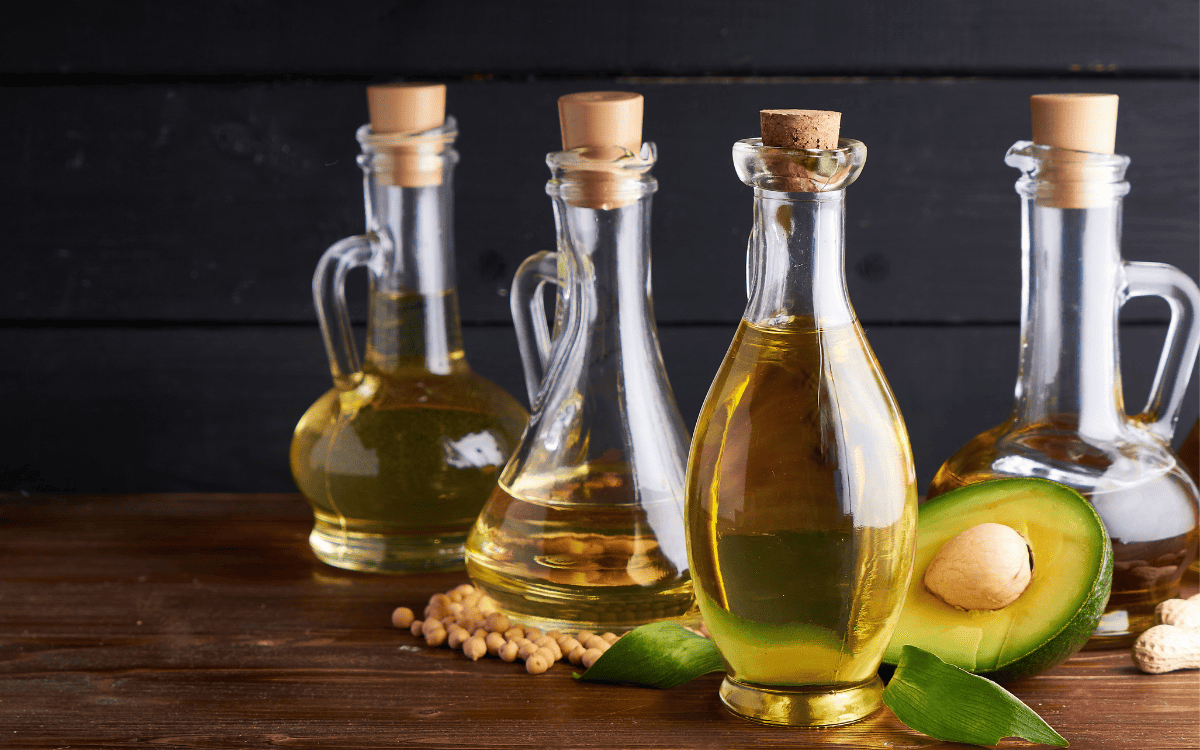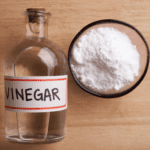Perfectly cooked food and easy cleanup aren’t the only reasons I use my Blackstone whenever the weather allows. If I’m honest, one of my favorite parts of the experience is adding to the protective seasoning that leaves my griddle better off with every use. My Blackstone looks incredible, and maintaining the flat top doesn’t take any work beyond cooking!
Building on a well-seasoned surface is effortless. But those critical base layers need at least a little forethought. If you season your new Blackstone griddle without considering the oil or technique, you can easily prolong the process or leave a lackluster and fragile foundation.
Although numerous cooking oil options can yield quality results, a basic understanding of how seasoning works will ensure you make the most practical choice. Set your griddle up for success by following my recommendation for the best oil to season Blackstone griddles.
What Is the Best Oil To Season Blackstone Grills?
Being objective with this answer isn’t easy. Respectable science on the issue is lacking, and any opinion you find directly contradicts the next. You’ll hear arguments for canola oil, avocado oil, extra virgin olive oil, and lard, each using their interpretation of the polymerization process to justify their choice. And don’t get me started on the flax oil debate.
I am no scientist and haven’t exhaustively tested every cooking oil out there. It’s also important to acknowledge the variation in processing that can make the same oil from two different brands behave differently. I know what works for me and would encourage anyone reading this to test my recommended options and find the one that best matches their process.
Grapeseed Oil (My Recommendation)
Disclaimers aside, I’ve found grapeseed oil to be the best oil to season a Blackstone griddle for the first time. It’s a high smoke point oil that won’t burn off before making that smooth coating. The high percentage of polyunsaturated fatty acids is ideal for forming consistent, durable layers. Grapeseed oil doesn’t add flavor to the griddle surface, and best of all, it’s not as pricey as some other high-quality seasoning oils.
I recommend looking for Pompeian 100% Grapeseed Oil online or at your local store.
| Smoke Point | 420°F |
| Polyunsaturated Fat Content | 70% |
| Monounsaturated Fat Content | 16% |
| Flavor Profile | Neutral |
| Price | Average |
The Best Oils To Use for Your Blackstone Griddle
Grapeseed oil may be my preference, but it’s hardly the only suitable oil for your Blackstone griddle. Plenty of people will disagree with me, and if they’re getting the results they want, I can’t be one to argue. But for the initial seasoning layers, some oils will provide a more steadfast protective coating.
As with cast iron seasoning, vegetable and nut oil varieties are generally the best griddle seasoning options. With more unsaturated fatty acids than bacon and other animal-derived fats, these can polymerize and carbonize more efficiently. Bacon also contains extra sugars, phosphates, salts, and other impurities that can weaken the bond with the griddle surface and cause flaking.
Beyond the fat content, factors like smoke point, shelf life, and flavor profile can affect your top choice of seasoning oil. Everyone has their preference, but if you haven’t yet found yours, start with these grapeseed oil alternatives.
The table below provides a list of oils recommended for seasoning a Blackstone griddle, along with their key features and ratings for suitability, affordability, and effectiveness on a scale of 1 to 10, where 10 is the most favorable.
| Type of Oil | Suitability Feature | Suitability Rating* | Affordability Rating* | Effectiveness Rating* |
|---|---|---|---|---|
| Grapeseed | High smoke point, high polyunsaturated fat content | 10 | 7 | 10 |
| Avocado | High smoke point, primarily unsaturated fats | 9 | 4 | 9 |
| Peanut | High smoke point, distinct flavor | 8 | 7 | 8 |
| Canola | High smoke point, high monounsaturated fat content | 7 | 9 | 7 |
| Soybean | High smoke point, lead ingredient in most “vegetable oil” labels | 6 | 10 | 6 |
Avocado Oil
Avocado oil is pricier, but many outdoor cooking enthusiasts swear by it for their Blackstone griddle seasoning. It consists primarily of unsaturated fats for efficient polymerization, and the high smoke point makes it comfortable to use on the red-hot griddle surface. Being stable at high heat also makes it healthier to use during everyday cooking.
While occasional use won’t leave much essence in the seasoning, I have noticed a mild flavor from avocado oil when using it that some people may not like. Otherwise, the primary downsides to it are the price and quality.
You can bet that avocado oil will be more expensive than most cooking oils, but you can’t always be sure of its contents. A recent study tested 36 private-label oils for purity and composition, finding that only 36% matched their advertised quality. Most had various adulterants, likely stemming from cheaper vegetable oils. As the researchers noted, investigating quality markers before purchasing will give you the most reliable results.
I recommend looking for BetterBody Foods Refined Avocado Oil online or at your local store.
| Smoke Point | 520°F |
| Polyunsaturated Fat Content | 14% |
| Monounsaturated Fat Content | 70% |
| Flavor | Mild |
| Price | Expensive |
Peanut Oil
Peanut oil has a distinct flavor you will often notice after you season Blackstone griddle plates several times. Alongside the allergy concerns, that could disqualify it for many people. But if you can overcome those hurdles, its high smoke point and unsaturated fat content make it a perfect candidate for laying down a non-stick surface.
I recommend looking for La Tourangelle’s Roasted Peanut Oil online or at your local store.
| Smoke Point | 450°F |
| Polyunsaturated Fat Content | 30% |
| Monounsaturated Fat Content | 50% |
| Flavor | Moderate |
| Price | Average |
Canola Oil
Canola oil is a tried and true grill seasoning oil, a cheap and relatively risk-free option that can still give you excellent results. Its smoke point is high enough to make a practical initial seasoning layer, as is the unsaturated fat content. Overcomplicating the Blackstone seasoning process is all too easy, and canola oil keeps you grounded with simplicity and effectiveness.
I recommend looking for Wesson’s Pure Canola Oil online or at your local store.
| Smoke Point | 400–425°F |
| Polyunsaturated Fat Content | 11% |
| Monounsaturated Fat Content | 63% |
| Flavor | Neutral |
| Price | Cheap |
Soybean Oil (“Vegetable Oil”)
Soybean oil is the lead ingredient in most bottles bearing the “vegetable oil” label at the grocery store. Cheap refined soybean oil has a higher smoke point than pricer cold-pressed varieties, making it a highly suitable seasoning.
While it makes a sound seasoning layer, I don’t advise using soybean oil as a general-purpose cooking oil. Vegetable oils are generally healthy, but studies have shown connections between soybean oil consumption and hormonal and neurological disorders. Avoiding it is challenging, as it appears in most foods, albeit in minute amounts. But cutting it out of your diet by choosing different cooking oils with similar heart health benefits can be wise.
I do not use soybean oils, but you are sure to find plenty of options in your local grocery stores.
| Smoke Point | 450°F |
| Polyunsaturated Fat Content | 55% |
| Monounsaturated Fat Content | 25% |
| Flavor | Neutral |
| Price | Cheap |
Why We Chose Grapeseed Oil
Having used several seasoning options, I’ve found grapeseed oil has given me the most consistent and desirable results. But every seasoning technique and oil variety differs to some extent. You may argue for your favorite brand of a different cooking oil, and if it works for you, that’s perfect! I’m not here to prove anyone wrong but rather to help you find an effective oil in the fewest attempts possible.
While you can succeed with several oils, there are a few that I would avoid for practicality. Try as I might to avoid the subject, I have to point out flaxseed oil as a great example.
Countless bloggers tout flax oil using unsupported scientific reasoning for its effectiveness. I admit that I have never tried it for seasoning. But as I’ve researched real user experiences, I’ve seen enough complaints about flax oil to know that it’s not the most reliable seasoning for a Blackstone griddle.
While some people only use flaxseed oil to season their Blackstone griddle, others discover their seasoning starts flaking after only a few uses. Take that inconsistency and add in the high price point and low availability, and flaxseed becomes one of the more low-value options.
Factors Affecting the Best Oil To Season Blackstone Griddles
Grapeseed oil has been my go-to for cast iron and griddles for a while now. Experience tells me it’s the best oil for seasoning my Blackstone, but the specs support my opinion. Cooking oils don’t have to be perfect to work well for seasoning, but you’ll get the most satisfaction by considering the following factors when picking a product.
High Smoke Point
Since the seasoning process raises the temperature beyond any oil’s smoke point, the choice of oil isn’t as critical for seasoning as it is for cooking. Still, I have noticed oils with a low smoke point, like extra virgin olive oil, have given me more inconsistent results.
Smoke points can vary depending on whether an oil is refined or unrefined. Refined oils will have higher smoke points, making oils like standard olive oil more heat stable than extra virgin olive oil. Labels for “unrefined”, “virgin”, or “cold-pressed” generally indicate it has a low smoke point compared to other versions of the same oil.
Unsaturated Fat Content
Unsaturated fats contain at least one double carbon bond, whereas saturated fats only have single carbon bonds. The carbon also bonds with hydrogen atoms, which “saturate” the fat. Double carbon bonds are more reactive, allowing oxygen molecules to slip into the mix easily to spur polymerization and bind fatty acid chains together (cross-linking).
Polyunsaturated fats have more than one carbon double bond, making them the most reactive and suitable for efficient seasoning. Options like grapeseed and sunflower oil are ideal for this reason, though any oil will contribute to the polymerized layers to some degree.
Note: the reactivity that makes unsaturated fats quick to polymerize also causes the oil to turn rancid faster. Between rancid oil’s smell and the negative health impact it can have, there are enough reasons to keep it away from the flat top. Consider shelf life when picking an appropriate oil, especially if you use it exclusively for seasoning.
Neutral Flavor
Avocado oil and other oils with a hint of flavor can impart it to your Blackstone’s cooking surface during seasoning, potentially affecting the food you cook. It’s a minor concern, but if you want a neutral flavor from your griddle seasoning, choose an option like canola or grapeseed oil.
Why You Should Season a Blackstone Griddle
Rolled steel Blackstone griddles, like cast iron skillets, lack protective coatings against the elements. With exposure to oxygen and moisture, carbon steel will rust. Though you can clean a rusty Blackstone and restore it to a like-new state, it’s a time-intensive process. Extensive rusting will eventually ruin your flat top as it slowly eats through the metal surface.
A thin coat of plasticized oil over a well-seasoned griddle creates a waterproof barrier that prevents oxidation and saves you from cleaning rust before every use. The non-stick grill surface improves with every seasoning layer. You can use less oil when cooking on a well-seasoned Blackstone, and you’ll give every meal a flavorful boost.
How Seasoning Works
Oil turns to a hard coating over a flat top grill surface through polymerization. With heat, iron, and oxygen as the catalysts, the long carbon chains that make up the fatty acids cross-link with carbon from other chains to form the plastic-like layer.
Unsaturated fats facilitate this reaction. Since these fats have fewer hydrogen atoms to get in the way, oxygen can more effectively react with the relatively unstable double carbon bonds in the chains. Oxidation will efficiently bridge the gap between nearby carbon chains, fusing them and turning the oil into a single polymer layer that bonds to the metal surface. Carbonization hardens and blackens the surface as the oil breaches the smoke point.
Tips for Seasoning Your Blackstone Griddle
Seasoning cast iron or carbon steel isn’t just about which oil you choose but also how you use it. Any oil can become a gummy or flaky mess if you put it on incorrectly.
While there’s more than one way to screw up the process, the mistake most people make is using too much oil. Your temperature can vary slightly, and you can often use whichever cooking oil you have handy. But one part of the process with little room for error is laying down the thinnest layer possible.
Pooling and overly thick oil won’t set entirely or evenly, leaving your seasoned surface sticky and inconsistent. After applying the oil, thoroughly wiping away the excess will be the primary factor in the results.
How To Season a Blackstone Griddle
Clean your brand-new Blackstone with soap and water to remove the factory coating. Rinse and dry with paper towels.
Turn your Blackstone to high heat, and let it warm for 10–15 minutes. The surface will brown as it heats. Pour 2–3 tablespoons of oil on your griddle top. Spread it evenly with a paper towel, absorbing excess as you wipe it down to thin the layer. The oil will smoke off as it polymerizes and carbonizes, creating that smooth, black coating on the griddle’s surface.
After the first layer finishes smoking off, add 2–4 more layers. You’ll then be all set to use your grill! For a more in-depth look into laying a solid foundation, check out our article on how to season a Blackstone griddle.
Saving Your Seasoning With Proper Care
After laying the initial seasoning on your new griddle, you only need to maintain it, which is often as easy as cooking on it. The more you use it, the more those seasoning layers will build. From there, maintenance is a simple matter of cleanup and storage.
Scrape your Blackstone thoroughly after cooking to release burnt-on food and excess oil. After wiping it down with a paper towel, apply a thin layer of oil to the griddle surface. In storage, this layer acts as additional protection against oxidation. When you fire up your flat top on the next use, the oil will heat and work into the existing seasoning.
Store your Blackstone griddle in a cool, dry place. Whether it’s on a porch or in a garage, always cover it with a waterproof cover (this is the one I have) to limit any chance of rust. Go a step further by checking on the griddle every 1–2 weeks if it’s in extended storage during the winter. Catching a rust spot early will make it easier to clean and prevent any unwanted surprises when you pull it out in the spring.
Frequently Asked Questions (FAQ)
Can I Mix Multiple Oils for Seasoning?
Mixing multiple oils for seasoning your Blackstone griddle is generally safe, provided you apply it correctly. The key is to apply a thin coat and allow it to smoke off completely before adding another layer. Some people mix oils to combine the benefits of different types, such as a high smoke point oil with one that adds flavor. However, be cautious about mixing oils with vastly different smoke points, as this could affect the seasoning process. Overall, if you’re considering blending oils, make sure to do it thoughtfully to achieve the best results.
What Oils Should I Avoid for Seasoning My Blackstone?
For seasoning your Blackstone griddle, it’s best to avoid animal-based fats like bacon grease and lard. These fats are high in saturated fats, which are less effective in forming a durable, polymerized coating. Additionally, they often contain additives like nitrates and sugars that can burn or leave a sticky residue on the surface. Stick to plant-based oils with high smoke points, such as flaxseed oil or canola oil, for optimal results.
Should I Use Blackstone Seasoning or Oil?
Blackstone Seasoning Griddle Seasoning & Cast Iron Conditioner is a specialized product that creates a durable, non-stick surface and protects against rust. It’s a foolproof option but is more expensive and only for seasoning, not cooking. On the other hand, using oil is more cost-effective and versatile, because you can also cook with it. If you’re new to seasoning your Blackstone or concerned about getting it right, investing in Blackstone’s proprietary seasoning may be worth the cost. Otherwise, a high-quality oil should suffice for both seasoning and cooking.









